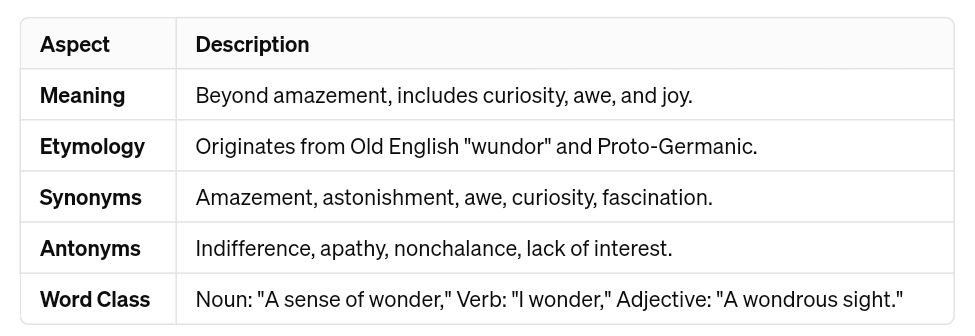
Wonder Facts: Unveiling Intriguing Insights into the Marvelous Emotion
Wonder Facts: Unveiling Intriguing Insights into the Marvelous Emotion
Introductory Remarks:
Wonder is the term that best encapsulates the sentiment that resides at the heart of the human experience. This sentiment is capable of transcending both language and culture. It embodies a complex interaction of curiosity, awe, and the profound joy that is generated by the extraordinary. It is more than just a symbol of amazement on its own. We delve into a universal language that resonates with the marvels of existence as we go on a quest to uncover the layers of wonder, beginning with its etymological foundations and then moving on to its different expressions.


Facts:
- Word Origin: The word “wonder” comes from Old English, where it was spelled “wundor.” This word has ancient roots in the Proto-Germanic language, specifically from the term “wundran,” which means to be amazed or marvel.
- Synonyms: “Wonder” can be used interchangeably with words like amazement, astonishment, awe, and admiration. It’s like when you see something incredible, and you feel curious and fascinated.
- Antonyms: On the other hand, words like indifference, apathy, and nonchalance are opposites of “wonder.” These words represent a lack of interest or surprise, as if something doesn’t catch your attention.
- Emotional Aspect: Wonder isn’t just about thinking; it’s also about feeling. When you experience wonder, it’s not just in your head – it makes you feel happy, excited, and like you’re witnessing something extraordinary.
- Philosophical Importance: Thinkers like Aristotle and Descartes have explored the idea of wonder in philosophy. It’s often connected to wanting to know more and understand things better.
- Early Beginnings: Looking back in history, “wonder” in Old English, or “wundor,” meant astonishment or marvel. It’s like when something surprises or shocks you, similar to the feeling expressed by the word “wound.”
- Changing Meanings: As time passed, the meaning of “wonder” expanded. It used to be just about surprise, but now it includes curiosity, awe, fascination, and even confusion. This shows how our understanding of the world has changed over the years.
- Grammar Variety: “Wonder” is a flexible word. It can be a noun, like “a sense of wonder,” a verb, like “I wonder,” or even an adjective, like “a wondrous sight.” This flexibility shows that “wonder” can describe many different things.
- Psychological Impact: The feeling of wonder is not confined to the mind; it also has an effect on the emotions that you experience. Being able to feel empathy, which is the ability to comprehend how other people feel, and being more creative are all tied to the experience of amazement.
- Cultural Significance: The concept of “wonder” is expressed by people all over the world in a variety of ways, including through writing, art, and religious practices. The fact that all people, regardless of where they come from, have a common experience of being impressed by the world is something that brings all people together.
- Literary Presence: The term “wonder” is a commonplace in the world of literature, where it is employed to elicit feelings, offer descriptions of fantastical situations, and investigate philosophical topics. Wonder serves as a source of inspiration for storylines and keeps readers interested, from Shakespeare to contemporary authors. When you read books or watch movies, “wonder” is a common theme. Characters often react emotionally and intellectually to extraordinary events, places, or things.
- Scientific Connection: When scientists investigate the natural world, they frequently experience a sense of wonder. They are motivated to study more and create new discoveries as a result of the wonder and curiosity from which they experience.
- Religious Connections: The concept of “wonder” is significant in many faiths because it allows people to connect with what is regarded as holy or magical. It’s almost like something that can help you get closer to a more profound comprehension of the wonders that life has to offer.
- Great Motivator: The experience of astonishment is not only a pleasant sensation; it also has the potential to motivate you to take action. It inspires people to find solutions to questions that arise when they are shocked or surprised, to be creative, and to explore the world around them.
- Everyday Language: The word “wonder” is still used in common parlance even in modern times. A sense of surprise, joy, or interest about new items, discoveries, or even other people can be expressed through the use of this tool.
- Universal Feeling: The feeling of wonder is something that everybody, regardless of where they come from, can identify with and relate to. There is a common feeling of awe and wonderment regarding the planet. Art, music, literature, and other forms of expression are just some of the ways that people all across the world convey this sentiment.








